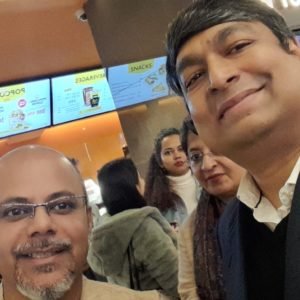My mobile phone rang two days before Christmas just like any other day. This time when I looked at it, a name flashed on the screen known to me. I have always treated him like an elder brother. I picked up the call and Srijato da (Sri Srijato Bandyopadhyay) in his warm polite voice invited me to the Premiere of his film Manabjamin. The affectionate warmth in his voice was like a bright sunny shine in the cold winter morning.
Finally the day of the Premiere arrived. I went to INOX, South City Mall, Kolkata to attend it on 6th January 2023. There was a galaxy of celebrities present to wish the filmmaker. Everyone adorned in their exclusive fashionable best greeted their acquaintances with mutual courtesy and love. A lot of buzz to get a bite from known film and television personalities by people from electronic media could be seen all around.
Frankly speaking, this was the first time I had ever been invited to any film premiere. So certain things which may be common to others were completely new to me. For example tickets were obtained from another counter not the regular one and by invitation. The seat numbers printed on those tickets were just a formality as everyone could choose where to sit according to their preference. While grasping these aspects of existing reality only one thing seemed pretty familiar to me. Most of the popular faces that were present enriching the vibrant atmosphere were the ones I had already encountered during childhood either in the clinic or drawing room of my elder uncle Late Dr Barin Roy or in Doordarshan Kendra Kolkata where I spent half my childhood as my mother Dr (Mrs) Indrani Roy worked there. I chose my preferred seat and settled down.
Srijato da took a microphone and called on stage, in front of the screen, all those who had played a pivotal role in making this film. One thing which really touched me was that Srijato da expressed his gratitude to all his teachers who had taught him since his boyhood days and they were part of this august invited audience. We live at a time when as people go up the social ladder so rootless they become. Being grounded is a luxury which many of them are unable to afford. With new found fame comes new found family and friends. They touch ground again when their social ladder breaks due to some misfortune or scandal bringing them crashing down. Living in such times it always pleases the eye to see such gestures which prove fame has not uprooted a person completely from the ground.
After the initial formalities the lights were dimmed and the film began. It was just a coincidence that the story mainly revolves around the bitter sweet relationship between a Jethu (elder uncle), a character played to perfection by Sri Paran Banerjee and his Bhaipo (nephew), played by Sri Parambrata Chatterjee. Though the story bears no resemblance to my life or my Jethu’s, still throughout the film I remembered my elder uncle Late Dr Barin Roy and missed him a lot.
In any joint family be it from ‘epar bangla’ or ‘opar bangla’, the relationships between family members are intricate and complicated, flavoured with both bitterness and sweetness. I mean if you can bring me one bangali who confirms that personal upbringing in a bangali joutho poribar (Bengali joint family) has been completely smooth without hiccups then I can also show you a liar. Because I know for sure that bangalis are capable of many transcendental things except two- (1) can’t accept a professional surpasser & (2) gets suffocated if there is complete peace and tranquillity in a joutha poribar (Joint Family). This Bengali truth has also found its place on the silver screen in audio-visual masterpieces like Golpo Holeo Sotti (1966) and Sakha Prasakha (1990). Robi Jethu’s (Late Robi Ghosh) one of the most memorable performances enlightened the former film. But his character as depicted in the film is an enjoyable, appreciable yet fictitious one. Because in reality any true bheto bangali deeply interested in involving oneself within the intricate relationships of a joutho poribar will definitely be successful in making situations go downhill. Though family relations shown in the aforementioned masterpieces were worth watching what we find today is its mutilated degenerated versions televised in modern mega-serials.
Manabjamin is a contemporary entertaining and enjoyable film produced by Sri Rana Sarkar dealing with three types of family relationships- first between a jethu and bhaipo, second between two friends in love on the verge of becoming family and third between the haves and have-nots. A cocktail of emotions were experienced throughout the one hundred and thirty one minutes. Some moments were heart touching and deep while others were so light and fun that you just can’t stop laughing. So that is what we expect when we visit a movie theatre and that is what we got. Every single frame had been well thought out and eye pleasing. Subtle political and philosophical punches were aptly delivered through the script. The story takes place in contemporary Bengal so a Bengali flavour was amply evident which all can relate to.
Sri Paran Banerjee outshone everyone with his portrayal of the protagonist character. Sri Kharaj Mukherjee brought to us our much deserved laughter. Smt Priyanka Sarkar and Sri Parambrata Chatterjee did justice to their roles. It was a new revelation to me as I found Durba boudi (Smt Durba Bandyopadhyay) to be a seasoned actor. True acting is when it does not look like acting, so natural it seems. Durba boudi’s acting was just like that and also the cameo played by Sri Srijit Mukherji- every single movement of his muscles of facial expression- flawless. How could anyone miss the scene where a celebrated poet, writer and director could be seen in the background at a café! Sri Joy Sarkar’s musical score was very nice. In fact Srijato da’s teaming up with Sri Joy Sarkar has worked wonders before and remains a good team.
The aerial views of urban Kolkata as a concrete jungle blended perfectly well with scenes which capture the vast breathing spaces of Kolkata Maidan. Also just before breaking for interval, the scene where the two main characters slowly walk away and the camera rises to catch the web of life acted perfectly by tranquil trees was excellent. The backbone of the film was provided by the melodious voice of Sri Arijit Singh and his awesome rendition.
Life is not perfect. No human being is perfect. Then how can we expect any human creation to be so? Thus Manabjamin also has its imperfections. Firstly we had two outdoor scenes occurring on Mahalaya and Soshthi (two significant days related to Durga Puja festival) which seemed imperfect. The way Soshthi is projected in the film seemed lifeless and barren. The air of Kolkata and West Bengal is always charged with a festive flavour during Soshthi. Banners and Hoardings are all around and no road wears a deserted look. I remember going from Jadavpur to Gariahat on Soshthi and found Srijato da endorsing a product on every alternate hoarding along the way. While in the film the same time frame was captured in a lifeless manner. Secondly the personal discussion between the two friendly characters towards the climax of the film seemed unnecessary like a drag. For the sake of discussion if we presume that the dialogues are necessary because it serves as a proper prelude to the poetic work of Sri Sankha Ghosh, still I would opine on the contrary that every part of a screenplay should feel like it is an inalienable part and not a forceful imposition. Thirdly since I have read works on hypnotism by Melvin Powers so I found the way hypnotism was projected in the film erroneous. Again for the sake of discussion I understand that certain poetic and literary liberties are required in any creative work still I would argue that those liberties should not be over stretched to limits whereby it dampens the basic essential realistic fabric of a sweet audio-visual creative work.
Moreover I do admit that arguments contrary to mine may me there which I accept and welcome as it invigorates the democratic social fabric. Here I am reminded of a quote by Chris Ware who once said, “One of the most valuable things one of my art teachers said to me was, ‘Don’t get upset by criticism. Value that fact that at least someone noticed what you did.”
Well to conclude I just have three things to say. Firstly I immensely enjoyed the film as it was an engrossing one hundred and thirty one minutes of my life. Secondly I would express my gratitude to Dr Barin Roy, my elder uncle, from whom I learnt many aspects of critical thinking. Thirdly after watching Manabjamin I eagerly await Srijato da’s next directorial offering.


